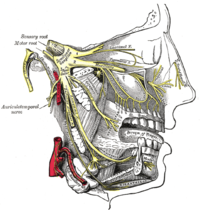
Photo from wikipedia
Abstract A significant number of patients suffers from refractory trigeminal neuralgia (TN) after receiving microvascular decompression (MVD) or other neuro-destructive procedure such as gamma knife radiosurgery (GKRS). This study aims… Click to show full abstract
Abstract A significant number of patients suffers from refractory trigeminal neuralgia (TN) after receiving microvascular decompression (MVD) or other neuro-destructive procedure such as gamma knife radiosurgery (GKRS). This study aims to demonstrate a remediable, reproducible approach to treating refractory pain effectively by percutaneous radiofrequency trigeminal rhizotomy (RF-TR). A total of 392 patients with TN were treated by RF-TR during the past 10 years. Among these patients, 48 cases who had received either MVD, GKRS alone, or a combination of both were assigned to group A. Those who had not received any form of treatment (125 patients) or failed to respond medically (130 patients) were assigned as the control group (group B). All the RF-TR were performed by a single surgeon with the aid of intraoperative computed tomography (iCT)-based neuronavigation with magnetic resonance (MR) image fusion. The outcome measure was the numerical rating scale (NRS) expressed subjectively by patients. The paired Student t test and the analysis of covariance (ANCOVA) were used for statistical analysis. In group A, 21 of 24 patients (88%) had significant improvement (NRS change ≥5) in facial pain after RF-TR. The average NRS score was 9.75 ± 0.53 before the procedure and 1.92 ± 3.35 post-treatment (significant NRS decrease [P = .000]). On the other hand, in group B, 226 of 255 patients (89%) also had dramatic amelioration of facial pain after RF-TR. The average NRS score was 9.46 ± 0.69 before the procedure and 1.62 ± 2.85 post-treatment (7.84 ± 2.82 in NRS decrease [P = .008]). By using a univariate ANCOVA, no statistical significance was found in NRS score improvement between the two groups. Repeated MVD and GKRS for refractory TN may be less desirable due to a greater risk of mortality (up to 0.8%) and morbidity (4% of serious complications). Conversely, RF-TR administration with the novel navigation technique by using iCT and MR image fusion is free from any remarkable and irreversible morbidities. In this study, RF-TR not only provided an alternative and effective strategy if TN recurred but also resulted in the same NRS score improvement regardless of the status of prior treatment.
Journal Title: Medicine
Year Published: 2022
Link to full text (if available)
Share on Social Media: Sign Up to like & get
recommendations!